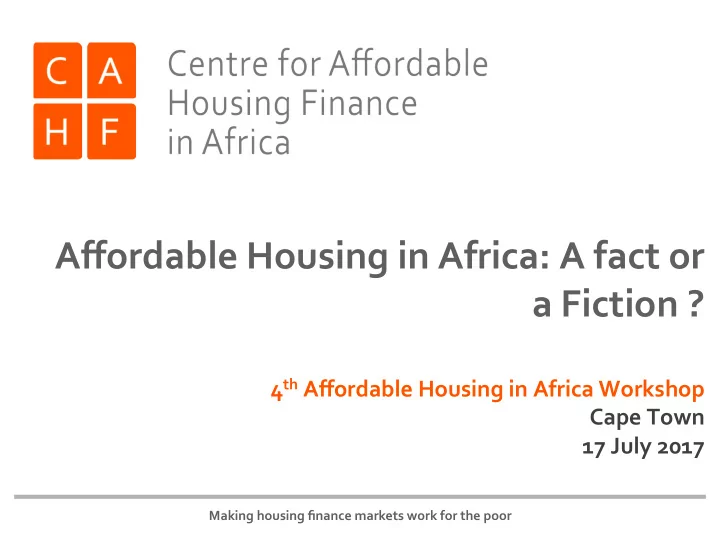

Affordable Housing in Africa: A fact or a Fiction ? 4 th Affordable Housing in Africa Workshop Cape Town 17 July 2017 Making housing finance markets work for the poor
Housing backlog in Africa Morocco (pop. 33.01m) Housing deficit of 800k units, growing 178K p.a. Cameroon (pop. 25m) Housing backlog of over 700k Ethiopia (pop. 94.1m) units Estimated deficit of 1mn units; 100k annual shortage Uganda (pop. 37.6m) Ivory Coast (pop. 20.3m) Estimated annual housing Housing backlog of over deficit of 233k units. 700k units Urbanisation in Kampala highest in Africa. Kenya (pop. 44.4m) Nigeria (pop. 173.6m) Housing backlog of 2m units; Housing backlog of 17m; annual estimated annual deficit of shortage of 700k units 200K units Tanzania (pop. 51.8m) Housing backlog of 3m units; Angola (pop. 21.5m) estimated annual deficit of Housing deficit of over 1.9m; 200K units estimated annual shortage of 100K South Africa (pop. 53m) Housing deficit of 2-3m units; an estimated 1.5m Source: Presentation by Dr Issa Faye to the AUHF households live in slums Conference, 26 October 2015. AfDB Research quoting Page 2 CAHF, UN-Habitat, National Sources
Housing affordability • Housing affordability is generally a function of three things: • 1) The price of the house that is available for sale • 2) The household's income • 3) The terms of the mortgage loan for which the household qualifies Page 3
House Price In 2016, the cheapest, formal, newly built house built by a private developer cost 14 941 USD in Benin, 23 962 USD, in South Africa, 33 000 USD in Burundi, and 200 000 USD in Angola. Page 4
Finance availability and terms: most African countries offer mortgages at rates above 10%, and for less than 20 years. In west Africa most of the mortgage terms are less than 10 years. Page 5
Finance availability and terms: Mortgage to GDP in Senegal, CAR, Togo, Cameroon is close to zero Page 6
Finance availability and terms Page 7
Household Income • How much can households in Africa affords to spend on their housing given their income and the range of other things that occupy their finances ? • We use proxies: a rough estimate of household income, segmented into bands that then offer the potential for different sorts of housing products, delivered all at once or incrementally, financed with a mortgage, other forms of secured finance, unsecured housing finance, or savings. Our affordability graphs use C-GIDD (Canback Global Income Distribution Database) 2015 data (in constant 2005 US$) and apply various assumptions relating to house price and mortgage affordability. Plotting the number of households by annual household income, in rural and urban areas, the graphs offer an indication of housing affordability and suggest where investors and developers might target their efforts. Page 8
Household Income: South Africa: Less than 36% of the population can afford the cheapest newly built house Page 9
Household Income: Benin: Less than 20% of the population can afford the cheapest newly built house Page 10
So what are the initiatives taken by governments in francophone Africa: The example of Côte d’Ivoire • In 2012, the newly elected government launched a presidential program for affordable housing with the objective of building more than 75 000 housing units in Abidjan, including 60 000 low-cost units (starting price of 5 million FCFA (7500 euros)) • However, four years after the project began, the government has admitted that very few social houses have been completed, despite an initial delivery date of December 2015. • The government announced in 2015, well after construction had started, that the selected companies were unable to provide housing units at that price. By the end of 2016 they annouced that the price for the « affordable units » would be between 12 and 15 million FCFA (18 293 and 22 867 euros). Page 11
So what are the initiatives taken by governments in francophone Africa: The example of Côte d’Ivoire • Furthermore, by analysing the 75 000 applicants, the Ivorian authorities realised that over 60% of them may see their applications rejected by bankers and real estate developers. • In response to these difficulties, the government announced that he his is planning to buy, through the Social Housing Fund (Fonds Social de l’Habitat), all of the completed units that meet the technical specifications outlined by the program. He also announced the establishment of a buyer credit guarantee fund, that would be funded 50% from the taxes collected on imported cement and clinker. • The government's offer to repurchase the homes already completed could be an effective short term lever to expedite low-cost housing for the segment of the population that needs it the most. However, precautions should be taken to avoid price inflation by the developers. • high risk that this ambitious program to provide affordable housing options will turn into a real estate program, benefitting only the middle and upper classes; Page 12
So what are the initiatives taken by governments in francophone Africa: The example of Côte d’Ivoire • Conclusion: • The lack of knowledge of the affordable housing market, and the lack (or sometimes non-existence) of affordable housing finance products, is something common in most african countries and is one of the many reason governments, even with good intentions, ends up in this situation. • Affordable Housing in Africa is, as of now, both a fact and a fiction Page 13
Thank you! Olivier Vidal Francophone Programme Manager olivier@housingfinanceafrica.org www.housingfinanceafrica.org h"ps://www.facebook.com/HousingFinanceAfrica?ref=hl Twi"er @CAHF_Africa Twi"er @AUHF_Housing h"p://housingfinanceafrica.org/projects/case-studies/ The Housing Finance in Africa 2016 Yearbook can be downloaded from hLp://www.housingfinanceafrica.org/document/2016-housing-finance-in-africa-yearbook/ Page 14
Recommend
More recommend